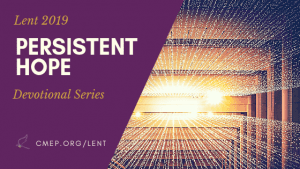
What does it mean to have Persistent Hope in the midst of disappointment and despair? Throughout the 40 days of Lent, this is the theme I am wrestling with, praying through, and seeking to understand as we wait together and long for Easter morning. This is our question and prayer as we seek peace and work toward justice in the Middle East.
Looking toward the Middle East, there are many realities that bring disappointment. An independent and viable State of Palestine does not seem to be a reality that will come to fruition anytime soon. The occupation of East Jerusalem, the West Bank, and Gaza continues and will soon enter into its 52nd year. The United States continues to manifest hubris and abuse its power by intervening in unconstructive ways, at best. None of the parties involved in the Israeli-Palestinian conflict have any faith the Trump Peace plan will break the decades-long status quo and make any constructive strides toward peace. Beyond Palestine, the United States’ continual support of Saudi Arabia and Coalition forces intervening in Yemen’s civil war constitute only one additional example of harmful U.S. interventions. The list could go on.
As we observe the season of Lent, the Middle East continues to be wrought in conflict. The civil war in Yemen has been described by the United Nations as the greatest humanitarian crisis of our time. The ongoing occupation of the Palestinian people has been described as an intractable conflict to which there seems to be no end.
Where is God in the midst of these harsh realities?
Is God fair in his dealings with creation and will he intervene?
Is God silent in the midst of the suffering of so many in the Arab world and throughout the Middle East?
Lent marks a sacred Christian tradition of repentance, fasting, and prayer. During Lent, Christians around the world will fast and reflect about ways we have fallen short and are in need of the mercy of God.
Lent marks a sacred Christian tradition of repentance, fasting, and prayer. During Lent, Christians around the world will fast and reflect about ways we have fallen short and are in need of the mercy of God. What better way to enter into the Lenten season than to wrestle with the brokenness we witness in the world around us and experience in our own lives? All of us have struggles individually, and places in our lives where we wrestle with these questions. Philip Yancey writes about them in his book, Disappointment with God. He identifies them as the “Three Questions No One Asks Out Loud”: Is God unfair? Is God silent? Is God hidden?
God’s mercy is certainly needed for those of us committed to peace and working toward justice in the Middle East. God’s mercy and intervention is certainly needed in the brokenness we experience within ourselves and in the world around us. In light of these current realities and unresolved brokenness, it is natural to ask, “Where is God in the midst of this?” We are reminded of the cry of the Psalmist, “My soul is in deep anguish. How long, Lord, how long” (Psalm 6:3). May we observe our Lenten reflections with this cry of our heart.
An inspired by Psalm 51, often read during Ash Wednesday services to mark the beginning of Lent:
Lord God, merciful one, accordingly to your unfailing love blot out our transgressions and heal the brokenness of the world. Forgive our sins and wash away our failures and inadequacies. Intervene and hear the cry of our hearts that the world may be made right, conflicts would cease, that you might restore the joy of your salvation. Cleanse us from our sins and we will be clean; wash us, whiter than snow. May we hear your joy and gladness and once again rejoice at the liberation you bring. Do not cast us from your presence, nor take your Holy Spirit, but grant us willing spirits, and sustain us. Come with your goodness, your mercy, and your grace. Be with the people of the Middle East—Jews, Muslims, and Christians, and people of all faith traditions. May conflicts cease and peace prevail. Be with us and with those who are absent from us.
Amen.
 Rev. Dr. Mae Elise Cannon is the executive director of Churches for Middle East Peace and an ordained pastor in the Evangelical Covenant Church (ECC). She is the author of Social Justice Handbook, Just Spirituality, and co-author of Forgive Us: Confessions of a Compromised Faith. She formerly served as the senior director of Advocacy and Outreach for World Vision U.S. on Capitol Hill in Washington, DC, and as a consultant to the Middle East for child advocacy issues for Compassion International in Jerusalem.
Rev. Dr. Mae Elise Cannon is the executive director of Churches for Middle East Peace and an ordained pastor in the Evangelical Covenant Church (ECC). She is the author of Social Justice Handbook, Just Spirituality, and co-author of Forgive Us: Confessions of a Compromised Faith. She formerly served as the senior director of Advocacy and Outreach for World Vision U.S. on Capitol Hill in Washington, DC, and as a consultant to the Middle East for child advocacy issues for Compassion International in Jerusalem.
 If this devotion is speaking to you, subscribe to the Lenten devotional series from Churches for Middle East Peace, and consider registering today for the June 2019 Advocacy Summit: Persistent Hope. This event will be an opportunity to continue to work to end the occupation of the Palestinian people and to work toward a just peace throughout the Middle East. Hope remains an act of resistance and defiance. Join CMEP as we celebrate and strategize for how to best carry out this work in the future.
If this devotion is speaking to you, subscribe to the Lenten devotional series from Churches for Middle East Peace, and consider registering today for the June 2019 Advocacy Summit: Persistent Hope. This event will be an opportunity to continue to work to end the occupation of the Palestinian people and to work toward a just peace throughout the Middle East. Hope remains an act of resistance and defiance. Join CMEP as we celebrate and strategize for how to best carry out this work in the future.


